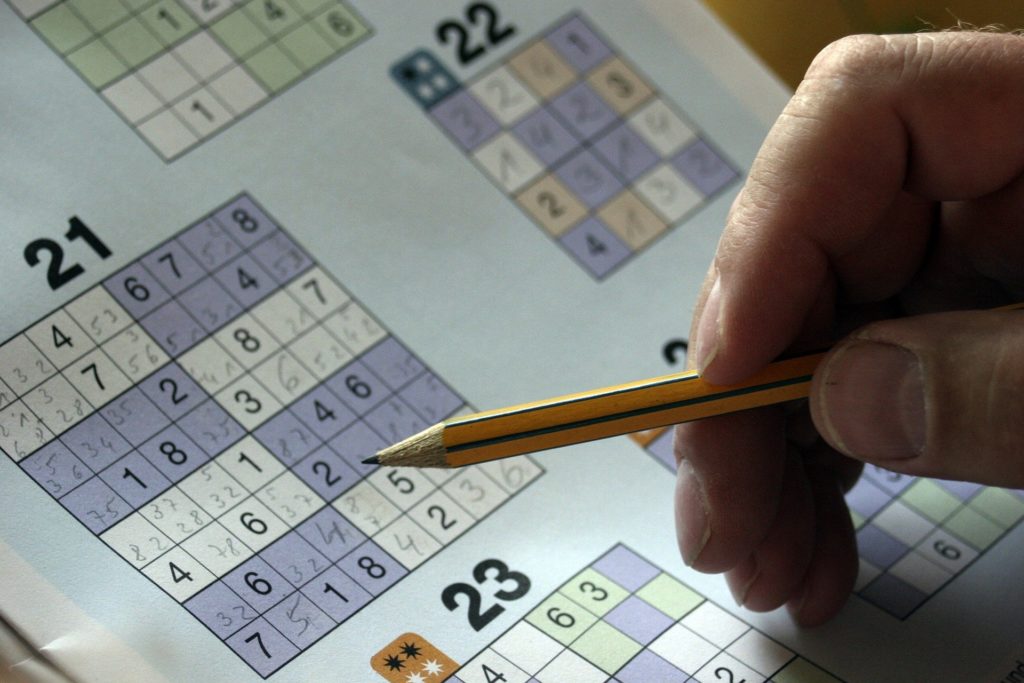Want to stay sharp? Do crossword puzzles or sudoku

Research shows that brain training and solving puzzles can keep your brain 10 years younger
We all have those forgetful moments when we can’t remember where we put our phone or why we opened the refrigerator. But to keep our minds sharp, studies suggest we need to keep them active as well.
Solving puzzles – or, at the very least, attempting to fill in the answers – has been shown to be beneficial brain training exercises to help keep our gray matter healthy.
A study published in the International Journal of Geriatric Psychiatry, shows that people over 50 years of age who do sudoku and/or crossword puzzles have better brain function than people their age who do not.
The study’s researchers used a variety of tests to measure attention, memory and reasoning. The findings showed that the more people engaged in puzzles, the better they did on the tests.
Can puzzle solving and brain training reduce the risk of dementia in later life?
That is the big question.
About 19,000 people took part in the study that tested their cognitive function through online puzzles and games. Those who did puzzles regularly scored better in speed and accuracy compared to participants who did not play word or number puzzles.
Researchers say the study shows that solving puzzles and brain training can keep our brain 10 years younger.
The survey’s results support earlier findings from other studies that show how regular word and number puzzle play can help keep our brains working better and for longer. However, researchers also note that there was no definitive answer whether playing these puzzles could reduce the risk of dementia later in life.
“When the pathology is overwhelming, which happens in aggressive dementias, no amount of brain strength can help slow progression,” said Dr. Gayatri Devi, a neurologist specializing in memory disorders at Lenox Hill Hospital in New York City. “Thankfully, most kinds of dementia and Alzheimer’s disease are slowly progressive, and we can shore up our brain’s strength or cognitive reserve to either delay the onset of dementia or to prevent it.”
And though no conclusive answers are available just yet, the scientists are hardly calling it a day. In fact, the researchers say they’re following up with the participants to assess the long-term effects of puzzle playing for exactly that reason – to ascertain whether brain training like doing puzzles can reduce the risk of cognitive decline or dementia.
Why do we get so distracted as we get older?
Researchers note that it is important to challenge our brains, especially as we get older. Studies have shown that cognitive skills such as mental quickness, divided attention, ignoring distraction and shifting our attention all tend to decline with age.
When we lose cognitive function, our lifestyle and social activities are detrimentally affected, too.
Barbells for the brain
One of the reasons crossword puzzles are recommended as brain training is because we tend to get better at word-related games as we age. Doing sudoku and crossword puzzles can help us in our thinking, attention and reasoning.
So, to keep our brains sharp, science shows that puzzles or other brain-challenging hobbies are the way to go. The most important thing is to do mental exercises to strengthen our brain networks. It can be crossword puzzles or sudoku, it can also be word games or anything else that makes us think.
So, pick your favorite brainteaser and give your gray matter a good workout!
Interested in learning more about brain training? Don’t miss our article on the 10 easy steps to improve your memory.




